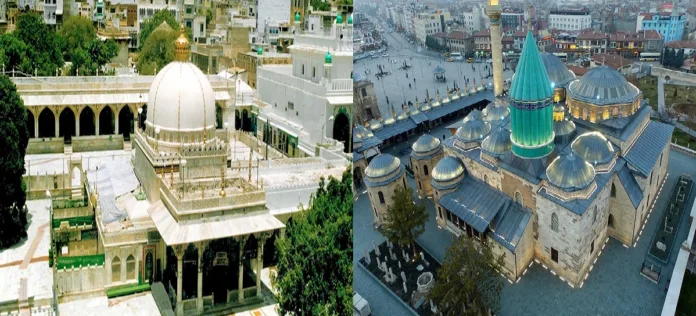✍ Dr. Shujaat Ali Quadri – India
India and Turkiye share a deep historical and cultural connection that dates back centuries. While modern diplomacy focuses on trade, defense, and geopolitical cooperation, the spiritual and philosophical heritage of Sufi saints like Hazrat Khwaja Moinuddin Chishti of India and Mevlana Jalaluddin Rumi of Turkiye can play a pivotal role in strengthening Indo-Turkish relations. Both saints preached love, tolerance, and unity—values that resonate even today. By reviving their shared Sufi legacy, India and Turkiye can foster people to people connections, enhance cultural diplomacy, and build a stronger bilateral relationship.
Sufism, the mystical dimension of Islam, has historically served as a bridge between diverse cultures. Sufism, the mystical branch of Islam, transcends rigid doctrines and speaks directly to the heart. Among its most radiant symbols are the Ajmer Dargah in India and the Mevlana Rumi mausoleum in Konya, Turkiye two spiritual epicenters that have, for centuries, inspired seekers across religions, cultures, and borders. The teachings of Khwaja Moinuddin Chishti of Ajmer and Jalaluddin Rumi of Konya share a profound essence—love, compassion, tolerance, and unity. As the world grapples with rising extremism, materialism, and cultural fragmentation, there is a growing urgency to establish a common global platform to promote the inclusive Sufi ethos that both saints embodied.
Cultural Diplomacy Through Shared Sufi Heritage
India and Turkiye can leverage the global appeal of Rumi and Chishti to foster people-to-people cultural exchanges. Cultural diplomacy through festivals, exhibitions, poetry readings, and musical performances can showcase the parallel spiritual traditions that bind the two countries.
Joint Rumi Chishti Festivals featuring qawwali and Sema (whirling dervish) performances could be hosted annually, alternating between Konya and Ajmer.
Poetry symposiums and Sufi conferences could deepen cultural respect and scholarly collaboration.
Spiritual Tourism and Pilgrimage Corridors
Both countries are home to major spiritual destinations Ajmer Sharif in India and Rumi’s tomb in Konya, Turkiye. These shrines attract millions of pilgrims, not only Muslims but seekers from all walks of life.
India and Turkiye could initiate a Sufi Pilgrimage Corridor under a special visa scheme or cultural agreement, encouraging mutual visits and tourism development. Travel packages, joint documentaries, and digital storytelling around these sites can enhance awareness and engagement. Ajmer and Konya could be developed as Sufi twin cities, encouraging tourism-linked businesses, artisan trades, and hospitality services.
Educational Collaboration and Sufi Studies
Universities and Islamic seminaries in both countries can establish joint centers for Sufi studies focusing on comparative teachings of Rumi and Chishti.
Student and faculty exchange programs can encourage academic dialogue. Co-authored research projects can explore shared themes in their writings love, mysticism, social justice and make this knowledge accessible globally.
Strengthening Inclusiveness & Moderation
In a world where radical ideologies often hijack religious narratives, Rumi and Chishti offer a moderate, inclusive vision of Islam rooted in love and inner transformation. Collaborative platforms can help Indian and Turkish Muslim communities emphasize spiritual Islam over political or sectarian interpretations. Joint programs could train young leaders in Sufi ethics, conflict resolution, and interreligious dialogue.
The convergence of Rumi’s poetic mysticism and Moinuddin Chishti’s compassionate outreach offers not just a bridge between India and Turkiye, but a pathway to global spiritual renewal. By institutionalizing and celebrating their shared legacy, India and Turkiye can go beyond transactional diplomacy and forge a deep, enduring cultural partnership based on shared values of humanity, love, and divine connection.
In an age marked by division, Chishti and Rumi remind us that the heart knows no borders and diplomacy rooted in the soul has the power to unite where politics cannot.
